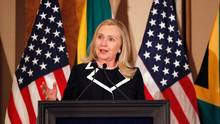U.S. to offer South Africa $2-billion in clean energy loans
 The U.S. will offer South Africa up to $2-billion (U.S.) in loans to fund renewable energy ventures involving American companies, a top official said Monday, a potential boon for both the electricity-hungry nation and U.S. business interests.
The U.S. will offer South Africa up to $2-billion (U.S.) in loans to fund renewable energy ventures involving American companies, a top official said Monday, a potential boon for both the electricity-hungry nation and U.S. business interests.The 18-year loans will be funded out of the U.S. Export-Import Bank, the government’s vehicle for promoting U.S. export sales by providing low-interest loans for services and goods produced by American industries. The funding could be applied to a variety of projects, including wind, solar and thermal power, said Fred Hochberg, the bank president and chairman.
U.S. and South African officials plan to sign a formal agreement for the loans Tuesday as U.S. Secretary of State Hillary Clinton continues her visit to South Africa.
“The government here has really been a leader in thinking forward about energy policy,” Mr. Hochberg told journalists during a break at a U.S.-South African business summit.
Companies that could benefit from the funding include General Electric Co., Santa Monica, Calif.-based SolarReserve LLC, and Siemens AG, Mr. Hochberg said.
South Africa, the continent’s biggest economy, has seen its growth slowed in part due to an ongoing electricity crisis as public utility Eskom struggles to meet demand. Energy Minister Dipuo Peters told those gathered at the summit that investment in the country’s power generation remained vital if the country – and Africa as a whole – is to grow into the coming years.
“Without access to energy services, the poor will continue to be deprived of the most basic economic opportunities to improve their status of living,” Ms. Peters said.
Ms. Clinton, on a tour of African nations, later addressed the business summit, stressing the importance of expanding business, as well as diplomatic ties, with South Africa. It isn’t just renewable energy at play here. Boeing Co. remains in the running to provide aircraft to South African Airways as it looks at updating its fleet, Mr. Hochberg said.
“This is the sixth country I’ve visited on this trip, and though each country in this fabulous continent is unique, I have delivered one consistent message: We want sustainable partnerships in Africa that add value rather than extract it,” Ms. Clinton said.
However, business leaders at the summit acknowledged the challenges of doing business in Africa, including concerns about political stability and fears of potential takeovers of private industries by the government. While South African leaders continue to promise businesses free and unfettered access to their market, some politicians continue to raise the possibility of nationalizing mines and other industries.
You can return to the main Market News page, or press the Back button on your browser.

